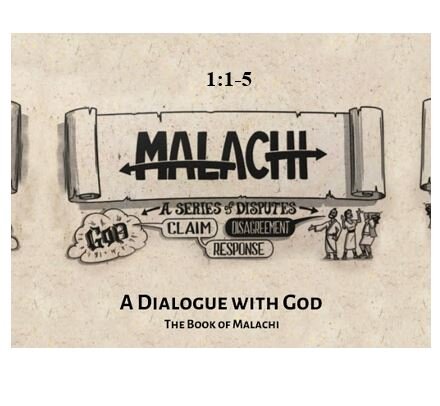BIG IDEA:
THE LORD’S COMPASSION GIVES HOPE AND SOFTENS THE BLOW OF HIS REBUKE OF THE PROUD CRIES OF THE SELF RIGHTEOUS
(:1) INTRODUCTION TO BOOK:
A. Authoritative Content and Source
“The oracle of the word of the Lord”
Literally: “the burden” – woe is the prophet who does not faithfully deliver the message which the Lord has laid on him
Kelley: Whenever “oracle” is used to designate a prophetic utterance, it always is an utterance that is threatening and condemnatory in character. T. V. Moore describes the threatening nature of such oracles: “Like some dark cloud, heavy with its pent-up fury, these prophecies are surcharged with the wrath of God, and hang ready to pour their dreadful contents on those against whom they are directed.”
B. Target Audience = God’s Chosen People
“to Israel”
C. Prophetic Messenger
“through Malachi”
Ryrie: Malachi means “my messenger” and could simply be a designation of an anonymous writer. More likely, however, it is a proper name. He is not mentioned elsewhere in the OT.
I. (:2-3) PROOF OF THE LORD’S COMPASSION FOR HIS PEOPLE
A. (:2a) Affirmation of Love
“’I have loved you,’ says the Lord.”
Why isn’t that enough for us? 1 John 3:1
Morgan: The Hebrew tense marks continuity. It does not look back only, but around and on, and I think may be rendered for our more accurate apprehension, “I have loved, I do love, I will love you,” saith the Lord . . . love that does not alter when it alteration finds.
B. (:2b) Self Righteous Question
“But you say, ‘How hast Thou loved us?’”
Implication: We deserved much better treatment than what we have received
Piper: What then is God’s answer to the question, “How hast thou loved us?” His answer is, I have loved you with free, sovereign, unconditional, electing love, that is how I have loved you.
C. (:2c-3) Confirming Proof of the Lord’s Compassion:
Contrast Between Treatment of Jacob (God’s Elect) and Esau
1. Reminding them of the obvious contrast
“’Was not Esau Jacob’s brother?’ declares the Lord. ‘Yet I have loved Jacob; but I have hated Esau’”
2. Graphically driving home his point – Complete Destruction
“and I have made his mountains a desolation and appointed his inheritance for the jackals of the wilderness.”
II. (:4) PERMANENT DISTINCTION — IN TREATMENT OF ELECT AND NON-ELECT
A. (:4a) False Optimism on the Part of the Wicked
“Though Edom says, ‘We have been beaten down, but we will return and build up the ruins’”
The Edomites were descendants of Esau.
Ryrie: Nebuchadnezzar invaded Edom in 586 (Jer. 25:9, 21), and later the Nabataeans drove the Edomites from their territory.
B. (:4b) Final Judgment executed by the Lord — Permanent Destruction
“thus says the Lord of hosts, ‘They may build, but I will tear down’”
The last grip on the bat belongs to the Lord
C. (:4c) Future Reputation
1. As to their Wicked Character
“’and men will call them the wicked territory,’”
2. As to their Final Destiny
“and the people toward whom the Lord is indignant forever.’”
Ryrie: Regarding how wicked Edom was, read Gen. 26:34; 27:41; Obad. 10-14.
III. (:5) PERSONAL TESTIMONY TO THE LORD’S COMPASSION
A. (:5a) Witnessing the Demise of the Wicked
“And your eyes will see this”
B. (:5b) Praising the God of Covenant Love
“And you will say, ‘The Lord be magnified beyond the border of Israel!’”
Piper: In other words, part of what it means to be loved by God is to know that God reigns — that he is great and mighty — even beyond the people called by his name. He reigns in Edom. His purposes are not ultimately frustrated by the wickedness of any people. “Great is the Lord, beyond the border of Israel!” Yes even in Edom — in Albania.
Laetsch: Alas, He finds no joyous appreciation of His affection, no grateful return of love for love, but coldhearted contempt of His grace and ungrateful, self-righteous, grumbling dissatisfaction with His ways.

